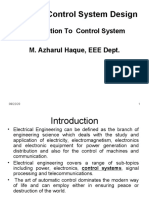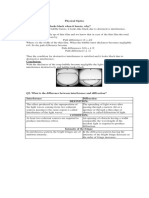0 ratings0% found this document useful (0 votes)
3 views1_introduction to Modern Control Lecture 1
Modern Control Theory is an interdisciplinary field that focuses on the behavior of dynamical systems and their modification through feedback mechanisms. It encompasses various control systems, including open-loop and closed-loop systems, and is applicable to multiple-input and multiple-output (MIMO) systems. While it offers advantages such as optimization and the ability to analyze complex systems, it also involves complex techniques and extensive computations.
Uploaded by
adepapeentuaCopyright
© © All Rights Reserved
Available Formats
Download as PDF, TXT or read online on Scribd
0 ratings0% found this document useful (0 votes)
3 views1_introduction to Modern Control Lecture 1
Modern Control Theory is an interdisciplinary field that focuses on the behavior of dynamical systems and their modification through feedback mechanisms. It encompasses various control systems, including open-loop and closed-loop systems, and is applicable to multiple-input and multiple-output (MIMO) systems. While it offers advantages such as optimization and the ability to analyze complex systems, it also involves complex techniques and extensive computations.
Uploaded by
adepapeentuaCopyright
© © All Rights Reserved
Available Formats
Download as PDF, TXT or read online on Scribd
You are on page 1/ 15
MODERN CONTROL THEORY
LECTURE ONE
EBEN NORNORMEY
Ph.D. Renewable Energy Engineering
MSc, Telecommunications Engineering
BSc, Electrical/Electronic Engineering
ACCRA INSTITUTE OF TECHNOLOGY
SCHOOL OF ADVANCED TECHNOLOGIES
ENGINEERING AND SCIENCE
INTRODUCTION: MODERN CONTROL
Control Theory or Control Engineering
• is an interdisciplinary branch of Engineering and
Mathematics that deals with the behavior of
dynamical systems with inputs, and how their
behavior is modified by feedback.
• It also involves the design of an engineering product
or system where the requirement is to accurately
control Some quantity, (i.e the temperature in a room
or the position or speed of an electric motor).
INTRODUCTION: MODERN CONTROL
• The usual objective of control theory is to control a
system, often called the plant
INTRODUCTION: MODERN CONTROL
System:
• Is interconnection of elements and devices for a
desired purpose.
Control:
• is the process of causing a system variable to conform
to some desired value.
Control System:
• Is interconnection of components forming a system
configuration that will provide a desired response.
Process:
• Is the device, plant, or system under control.
INTRODUCTION: MODERN CONTROL
Open-Loop Control Systems
• utilize a controller or control actuator to obtain the
desired response.
INTRODUCTION: MODERN CONTROL
Closed-Loop Control Systems
• utilizes feedback to compare the actual output to the
desired output response
INTRODUCTION: MODERN CONTROL
Desired
Output Controller Process Output
Response Variables
Measurement
Multi Input Multi Output (MIMO) System
INTRODUCTION: MODERN CONTROL
Human System
Pancreas:
• Regulates blood glucose level
Adrenaline:
• Automatically generated to increase the heart rate and
oxygen in times of flight
Eye:
• Follow moving object
Hand:
• Pick up an object and place it at a predetermined location
Temperature:
• Regulated temperature of 36°C to 37°C
INTRODUCTION: MODERN CONTROL
There are THREE major divisions in control theory:
• Classical Control
• Modern Control
• Digital Control
INTRODUCTION: MODERN CONTROL
• Modern control engineering practice includes
the use of control design strategies for improving
manufacturing processes, the efficiency of energy
use, advanced automobile control, including rapid
transit, among others.
INTRODUCTION: MODERN CONTROL
Modern Control Theory
• is carried out in the state space and can deal with
multiple-input and multiple-output (MIMO) systems.
• This overcomes the limitations of classical control
theory in more sophisticated design problems, such as
fighter aircraft control, with the limitation that no
frequency domain analysis is possible.
INTRODUCTION: MODERN CONTROL
• First order differential equations defined using state
variables; Nonlinear, multivariable, adaptive and
robust control theories are used in MIMO.
• Matrix methods are significantly limited for MIMO
systems where linear independence cannot be
assured in the relationship between inputs and
outputs.
INTRODUCTION: MODERN CONTROL
Advantages of Modern Control Theory
• It is possible to analyze time-varying or time-
invariant, linear or non-linear, single or multiple input-
output systems.
• It is possible to confirm the state of the system
parameters also and not merely input-output
relations.
• It is possible to optimize the systems and useful for
optimal design.
• It is possible to include initial conditions.
INTRODUCTION: MODERN CONTROL
Disadvantages of Modern Control Theory
• Complex techniques
• Many computations are required.
INTRODUCTION: MODERN CONTROL
THANK YOU
You might also like
- Lesson #M1 - 1 Introduction To Control SystemsNo ratings yetLesson #M1 - 1 Introduction To Control Systems172 pages
- Chapter 20One 20 20Introdocution 20to 20Control 20SystemNo ratings yetChapter 20One 20 20Introdocution 20to 20Control 20System51 pages
- Control Systems: - 1 - Class Code: ME-2011A - Engr:M Irfan KhanNo ratings yetControl Systems: - 1 - Class Code: ME-2011A - Engr:M Irfan Khan33 pages
- MEM 355 Performance Enhancement of Dynamical Systems: Introduction To Control System DesignNo ratings yetMEM 355 Performance Enhancement of Dynamical Systems: Introduction To Control System Design26 pages
- Lesson #M1 - 2 Overview of Control SystemNo ratings yetLesson #M1 - 2 Overview of Control System170 pages
- Week 1 - L1 - Introduction and Basic Concepts of ControlNo ratings yetWeek 1 - L1 - Introduction and Basic Concepts of Control33 pages
- Bjectives: Chapter 1: Introduction To Control Systems ONo ratings yetBjectives: Chapter 1: Introduction To Control Systems O48 pages
- Pe 3032wk1introductiontocontrolsystemmarch04e 141007091431 Conversion Gate01No ratings yetPe 3032wk1introductiontocontrolsystemmarch04e 141007091431 Conversion Gate0169 pages
- RALPH JAN AQUINO Control System SummaryNo ratings yetRALPH JAN AQUINO Control System Summary13 pages
- Topic 1 - Intro To Control System EE 146No ratings yetTopic 1 - Intro To Control System EE 146119 pages
- Class 1 Introduction To Automatic Control SystemsNo ratings yetClass 1 Introduction To Automatic Control Systems23 pages
- ME 461 Control Engineering: Semester: July 2017No ratings yetME 461 Control Engineering: Semester: July 201732 pages
- School of Electrical Engineering and Computer Science Department of Electrical EngineeringNo ratings yetSchool of Electrical Engineering and Computer Science Department of Electrical Engineering24 pages
- Igital Ontrol Ystems: Dr. Umar Khan National University FAST, IslamabadNo ratings yetIgital Ontrol Ystems: Dr. Umar Khan National University FAST, Islamabad59 pages
- (Ebook) Modern control engineering by P.N. Paraskevopoulos ISBN 9780824789817, 0824789814 download100% (1)(Ebook) Modern control engineering by P.N. Paraskevopoulos ISBN 9780824789817, 0824789814 download56 pages
- Optical Design of Microscopes (SPIE Tutorial Text Vol. TT88) (SPIE Tutorial Texts) (PDFDrive)No ratings yetOptical Design of Microscopes (SPIE Tutorial Text Vol. TT88) (SPIE Tutorial Texts) (PDFDrive)245 pages
- Temporary Works Toolkit: Falsework For The Support of Horizontal SurfacesNo ratings yetTemporary Works Toolkit: Falsework For The Support of Horizontal Surfaces4 pages
- Light Reflection and Refraction Class 10 Numerica…No ratings yetLight Reflection and Refraction Class 10 Numerica…1 page
- Design and Fabrication of Gearless Power Transmisson in Angular Positions Using Rods100% (1)Design and Fabrication of Gearless Power Transmisson in Angular Positions Using Rods5 pages
- Lockhart and Martinelli Launched Two Basic Postulates For TheirNo ratings yetLockhart and Martinelli Launched Two Basic Postulates For Their4 pages
- Materials Science at The Nanoscale: C.N.R. RaoNo ratings yetMaterials Science at The Nanoscale: C.N.R. Rao12 pages
- essentials-of-robust-control-solution-manual-0135258332-9780135258330_compressNo ratings yetessentials-of-robust-control-solution-manual-0135258332-9780135258330_compress81 pages
- Ideal MHD Equations in Terms of Compressive Elsässer VariablesNo ratings yetIdeal MHD Equations in Terms of Compressive Elsässer Variables6 pages
- Suspended Systems: Lighting and SecurityNo ratings yetSuspended Systems: Lighting and Security8 pages
- Uygulamalı Mühendislik Matematiği SınavıNo ratings yetUygulamalı Mühendislik Matematiği Sınavı3 pages
- MAE 322 Machine Design: Dr. Hodge Jenkins Mercer UniversityNo ratings yetMAE 322 Machine Design: Dr. Hodge Jenkins Mercer University20 pages
- 1121214-Electrostatic Potential and CapacitanceNo ratings yet1121214-Electrostatic Potential and Capacitance21 pages
- Chapter 20One 20 20Introdocution 20to 20Control 20SystemChapter 20One 20 20Introdocution 20to 20Control 20System
- Control Systems: - 1 - Class Code: ME-2011A - Engr:M Irfan KhanControl Systems: - 1 - Class Code: ME-2011A - Engr:M Irfan Khan
- MEM 355 Performance Enhancement of Dynamical Systems: Introduction To Control System DesignMEM 355 Performance Enhancement of Dynamical Systems: Introduction To Control System Design
- Week 1 - L1 - Introduction and Basic Concepts of ControlWeek 1 - L1 - Introduction and Basic Concepts of Control
- Bjectives: Chapter 1: Introduction To Control Systems OBjectives: Chapter 1: Introduction To Control Systems O
- Pe 3032wk1introductiontocontrolsystemmarch04e 141007091431 Conversion Gate01Pe 3032wk1introductiontocontrolsystemmarch04e 141007091431 Conversion Gate01
- School of Electrical Engineering and Computer Science Department of Electrical EngineeringSchool of Electrical Engineering and Computer Science Department of Electrical Engineering
- Igital Ontrol Ystems: Dr. Umar Khan National University FAST, IslamabadIgital Ontrol Ystems: Dr. Umar Khan National University FAST, Islamabad
- (Ebook) Modern control engineering by P.N. Paraskevopoulos ISBN 9780824789817, 0824789814 download(Ebook) Modern control engineering by P.N. Paraskevopoulos ISBN 9780824789817, 0824789814 download
- Control System: Fundamentals and ApplicationsFrom EverandControl System: Fundamentals and Applications
- Optical Design of Microscopes (SPIE Tutorial Text Vol. TT88) (SPIE Tutorial Texts) (PDFDrive)Optical Design of Microscopes (SPIE Tutorial Text Vol. TT88) (SPIE Tutorial Texts) (PDFDrive)
- Temporary Works Toolkit: Falsework For The Support of Horizontal SurfacesTemporary Works Toolkit: Falsework For The Support of Horizontal Surfaces
- Light Reflection and Refraction Class 10 Numerica…Light Reflection and Refraction Class 10 Numerica…
- Design and Fabrication of Gearless Power Transmisson in Angular Positions Using RodsDesign and Fabrication of Gearless Power Transmisson in Angular Positions Using Rods
- Lockhart and Martinelli Launched Two Basic Postulates For TheirLockhart and Martinelli Launched Two Basic Postulates For Their
- essentials-of-robust-control-solution-manual-0135258332-9780135258330_compressessentials-of-robust-control-solution-manual-0135258332-9780135258330_compress
- Ideal MHD Equations in Terms of Compressive Elsässer VariablesIdeal MHD Equations in Terms of Compressive Elsässer Variables
- MAE 322 Machine Design: Dr. Hodge Jenkins Mercer UniversityMAE 322 Machine Design: Dr. Hodge Jenkins Mercer University
























































































